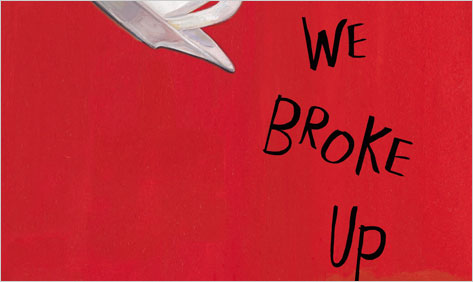Why We Broke Up

This novel, the fourth that Daniel Handler, better known for the novels he wrote under the name Lemony Snicket, which rival those written by a woman named Rowling in copies sold, has written under his own name, is arguably his first explicitly targeted towards older teens. Though the first two Handler novels featured high school and college-age protagonists, their subject matter (homicide and incest) made them more the province of literary adults.
The subject of Why We Broke Up — the unlikely romance between a “jocky” boy and a girl he insists, despite her protests, on calling “arty” — would sit comfortably next to any classic John Hughes movie. But the execution is a master class in the things books do best: It’s loaded with sly, beautifully produced illustrations by Maira Kalman and Handler’s exquisitely wrought sentences, brimming with charm and surprise, whether describing invented plots to classic films, clothes coming off a dry-cleaning rack, or the gorgeous banality, beauty, and terror of high school life.
The novel begins at the end: Sixteen-year-old Min — “call me La Desperada” — is making a pilgrimage in a borrowed truck to dump off a cardboard box containing the “prizes and the debris of this relationship, like the glitter in the gutter when the parade has passed.” The intended recipient is her ex-boyfriend, Ed, the co-captain of the basketball team, whom she met when he waltzed into her friend’s Bitter Sixteen party — featuring dandelion green pesto and an inedible 89 percent cacao cake in the shape of a black heart — looking exactly opposite its theme, “strong and showered” and “enormous as a shout.”
Ed is “like some movie everyone sees growing up”: “the jocky hero, handsome in the student newspaper and star of a million strands of gossip,” who always “has a girl on him in the hall, like they came free with a backpack.” She likes jazz, he likes mainstream rock “as bold and dull as a giant potato”; she wants to be a film director, he wants to be “winner of state finals.”
At first, she can’t believe a boy like him would be interested in a girl like her and struggles to put together “the print and the negative, the boyfriend and the celebrity shadow.” But he is utterly smitten; to him, she is “different,” like a “spicy food” from “Whatever-stan.” Though we know from the beginning — heck, from the title — to expect a bad end, Handler unfolds the odd-couple love story in a way that resists, rather than reinforces clichés — of boys and girls; jocks and freaks — while evoking the universal adolescent experience of falling in, then right back out of, love.